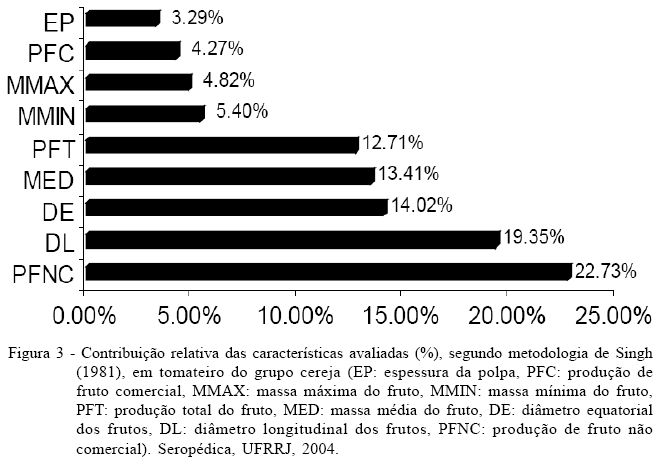Cherry tomato is becoming an important crop alternative mainly for small farmers that use family hand labor and use organic management to differentiate their product. The introduction of new genotypes in this market should be supported by germplasm characterization and evaluation. This germplasm could be recommended for farmers or introduced in breeding programs. The aim of this research was to test 40 cherry tomatoes accessions from different sources, being 36 accessions from germplasm collection of Department de Fitotecnia of UFRRJ and four cultivars, namely 'Joanna', 'Perinha Água Branca', 'Samambaia' and Super Sweet. The plants were grown in field conditions, under organic management, in a randomized block design with four replications and five plants per plot, from June to December 2004. The following variables were studied: fruit total yield; commercial and non-commercial fruit yield; longitudinal and equatorial fruit diameter; pulp thickness; minimum, medium and maximum fruit mass variation per plant. The data were analyzed considering Mahalanobis distance and the cluster analysis was performed using UPGMA (Unweighted Pair-Group Method Using an Arithmetic Average) and canonic variables. The adjustment between the similarity matrix and dendrograma was performed using the cophenetic correlation. The characters relative importance was determined by Singh´s method. The accessions were clustered in two groups, one of them with only one accession (ENAS 1021) and the second group, with 39 accessions, was subdivided generating seven subgroups. The cophenetic correlation was 0.9 meaning a very good adjustment between the distance matrix and the dendrogram. The first three canonic variables explained 78.58% of observed variation, forming seven groups. 'Perinha Agua Branca' was the one that produced lower proportion of non-commercial fruit yield (11.11%) while Super Sweet produced 48.05% of damaged fruit.
Solanum lycopersicum; germplasm; multivariate analysis; relative traits importance



